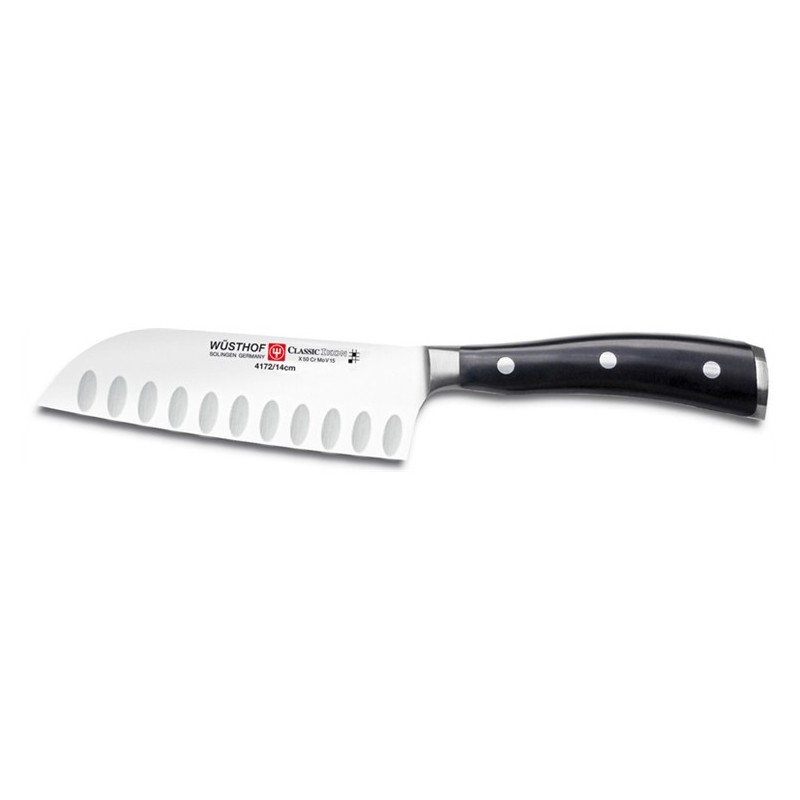A Santoku knife is a versatile kitchen tool that can be used for a variety of tasks, from chopping vegetables to slicing meat. The Wusthof Santoku knife is a high-quality option that is sure to make your cooking experience easier and more enjoyable. The blade of the knife is made from German stainless steel, which is known for its durability and strength.
The blade is also laser-cut and precision-honed for optimal sharpness. Additionally, the handle of the knife is ergonomically designed for comfort and balance.
A santoku knife is a great addition to any kitchen. It’s a versatile knife that can be used for slicing, dicing, and mincing. The Wusthof Santoku Knife is made from high-carbon stainless steel and has a comfortable grip.
The blade is also precision forged and has a full tang for strength and durability.
Wusthof Santoku Knife Set
Wusthof Santoku Knife Set
When it comes to kitchen knives, there is a lot of debate over which type is the best. But when it comes to Santoku knives, there is no debate – these Japanese-style knives are some of the sharpest and most versatile on the market.
And the Wusthof Santoku Knife Set is one of the best sets you can buy.
The set includes three different sizes of Santoku knife – 5 inch, 7 inch, and 9 inch – so you can tackle any cutting task in your kitchen. Each knife is made from high-carbon stainless steel and has a razor-sharp blade that will make quick work of any ingredient.
The blades are also precision forged and full tang for strength and durability.
The handles on these knives are comfortable to hold and offer a secure grip, even when your hands are wet. And the included knife block ensures that your new Santoku knives will have a safe place to call home.
If you’re looking for a top-quality Santoku knife set, then you need look no further than the Wusthof Santoku Knife Set. These German-made knives offer unbeatable quality and performance, and will make light work of any cutting task in your kitchen.
Wusthof Classic Santoku Knife
Wusthof Classic Santoku Knife
The Wusthof Classic Santoku Knife is a versatile all-purpose Japanese kitchen knife that can handle a wide variety of tasks. Its broad, straight blade is ideal for slicing and dicing vegetables, while its sharp point can be used for mincing and chopping meats.
The Wusthof Classic Santoku Knife is also excellent for slicing breads and fruits.
This knife features a comfortable grip that is easy to hold and maneuver. The blade is made of high-carbon stainless steel that resists rusting and staining.
The Wusthof Classic Santoku Knife has a full tang construction that provides balance and strength. This knife is handcrafted in Germany and comes with a lifetime warranty.
Wusthof Santoku Knife 5-Inch
Wusthof Santoku Knife 5-Inch
The Wusthof Santoku Knife is a versatile kitchen tool that can be used for a variety of tasks. This knife has a 5-inch blade and is made of high-quality stainless steel.
The blade is sharp and durable, making it ideal for slicing, dicing, and chopping. The handle is comfortable to hold and provides a good grip. This knife is perfect for those who are looking for a multipurpose kitchen knife.
Wusthof Santoku Knife 7
A santoku knife is a versatile kitchen tool that can be used for a variety of tasks, from chopping vegetables to slicing meat. The Wusthof Santoku Knife 7″ is a high-quality option that will make quick work of whatever you need to cut.
This knife has a blade made of high-carbon stainless steel, which is resistant to rust and corrosion.
The blade is also laser-cut for precision and has a sharp, 15-degree edge that will stay sharp with proper care. The handle is made of durable polypropylene and is ergonomically designed for comfort during use.
The Wusthof Santoku Knife 7″ is an excellent choice for anyone in need of a versatile and reliable kitchen knife.
It will make quick work of any cutting task and will last for years with proper care.
Wusthof Santoku Knife Angle
A Santoku knife is a Japanese all-purpose kitchen knife. It is similar to a chef’s knife, but has a shorter blade and is lighter in weight. The word “santoku” means “three virtues” or “three uses”, referring to the three main cutting tasks it can handle: slicing, dicing, and mincing.
The Santoku knife was invented in Japan during the Meiji period (1868-1912), as Western influences began to spread through the country. It quickly became popular among both home cooks and professional chefs for its versatility and ease of use.
The Santoku knife typically has a blade that is between five and seven inches long.
The most distinguishing feature of this knife is its slightly curved edge, which makes it ideal for slicing through meat and vegetables with a single stroke. The length of the blade also makes it perfect for chopping large quantities at once.
While Santoku knives are traditionally made from carbon steel, many modern versions are now crafted from stainless steel or ceramic.
This ensures that they will not rust or stain over time with regular use.
Wusthof Santoku Knife Review
Wusthof Santoku Knife Review
The Wusthof Santoku knife is a great all-purpose kitchen knife that can handle just about any task you throw at it. It’s a versatile tool that can be used for slicing, dicing, and mincing, and it’s also great for chopping herbs and vegetables.
The Wusthof Santoku knife is made with high-carbon stainless steel and has a full tang construction, which makes it extremely durable. The blade is also laser-cut to ensure precision cutting. The Wusthof Santoku knife has a comfortable grip that makes it easy to control, and the bolster provides balance while you’re cutting.
The Wusthof Santoku knife is an excellent choice for both home cooks and professional chefs alike.

Credit: www.cuchilleriadelprofesional.com
What is a Santoku Knife Best For?
A Santoku knife is a Japanese-style all-purpose kitchen knife. It is similar to a Western chef’s knife, but it has a straight edge and a much thinner blade. The word “santoku” means “three uses” in Japanese, referring to the three cutting tasks that this knife is best suited for: slicing, dicing, and mincing.
The Santoku knife is an excellent choice for general purpose chopping and slicing in the kitchen. It can be used for everything from chopping vegetables to slicing meat. The thin blade makes it easy to control, and the sharpness of the blade ensures that every cut is clean and precise.
If you are looking for an all-purpose kitchen knife that will perform well for all your cutting needs, then the Santoku knife is a great option.
Which Knife is Best Santoku Or Chef?
There are many types of knives available on the market, each designed for a specific purpose. Two of the most popular kitchen knives are santoku and chef knives. So, which is the best knife for your needs?
Santoku knives are shorter and lighter than chef knives, with a thinner blade. They typically have a granton edge (a series of small divots along the blade), which helps to prevent sticking and makes them ideal for slicing vegetables. Santoku means “three virtues” in Japanese, referring to the three tasks that this knife is traditionally used for: slicing, dicing, and mincing.
Chef knives, on the other hand, are heavier and have a thicker blade. They can be used for all sorts of tasks in the kitchen, from chopping vegetables to butchering meat. The extra weight and thickness make them more durable and better suited for tougher tasks.
And because they’re longer than santoku knives, they’re also great for cutting through large pieces of food.
So, which is the best knife – santoku or chef? It really depends on what you’ll be using it for.
If you need a versatile all-purpose knife that can handle anything you throw at it, go with a chef knife. But if you’re looking specifically for a vegetable slicer or want something lighter and easier to handle, then a santoku might be better suited to your needs.
What is a Santoku Chef Knife Used For?
A santoku chef knife is a multipurpose kitchen knife that can be used for a variety of tasks, such as chopping, slicing, and mincing. Santoku means “three virtues” or “three uses”, referring to the three main cutting tasks that this type of knife is designed for. The santoku chef knife has a shorter blade than a traditional chef’s knife, making it more maneuverable and easier to control.
Additionally, the blade has a slightly curved edge which makes it ideal for slicing and chopping vegetables and fruits.
While the santoku chef knife is often referred to as a Japanese-style knife, it actually originated in Germany in the early 1800s. The Japanese were quick to adopt this versatile tool into their own cuisine and culture, where it quickly became one of the most popular types of kitchen knives.
Today, santoku chef knives are widely available and are an excellent choice for both home cooks and professional chefs alike.
What is Difference between Santoku And Chef Knives?
When it comes to kitchen knives, there are all sorts of different shapes, sizes and types out there. But if you’re looking at two specific types of knives – santoku and chef knives – what’s the difference between them?
For starters, santoku knives are typically shorter and lighter than chef knives.
They also have a much thinner blade, which is ideal for slicing and dicing vegetables. Santoku means “three virtues” in Japanese, referring to the three things that this type of knife is best used for: chopping, slicing and dicing.
Chef knives, on the other hand, are heavier duty knives that can be used for a variety of tasks in the kitchen.
They’re great for chopping meat and vegetables, but can also be used for mincing garlic or herbs. Chef knives typically have a wider blade than santoku knives too, making them better suited for tougher jobs.
The different knives from Wusthof
Conclusion
The Wusthof Santoku Knife is a versatile kitchen knife that can be used for a variety of tasks. The blade is made of high-carbon stainless steel and is designed to resist rust and corrosion. The handle is ergonomically designed for comfort and balance, and the knife includes a full tang for strength and durability.
The Wusthof Santoku Knife is an excellent choice for both home cooks and professional chefs.
